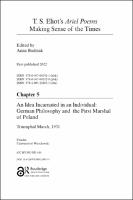Chapter 5 An Idea Incarnated in an Individual
Proposal review
German Philosophy and the First Marshal of Poland : Triumphal March, 1931
| dc.contributor.editor | Budziak, Anna | |
| dc.date.accessioned | 2022-09-08T12:16:59Z | |
| dc.date.available | 2022-09-08T12:16:59Z | |
| dc.date.issued | 2022 | |
| dc.identifier.uri | https://library.oapen.org/handle/20.500.12657/58173 | |
| dc.description.abstract | Written when Eliot rekindled his interest in Husserl and turned his attention to Heidegger, Triumphal March can be interpreted as a poem performing a philosophical experiment: it depicts the figure of a leader as seen in the light of Husserl’s Ideas and within the perspective of Heidegger’s Being and Time. This chapter, stressing philosophical contexts and sustaining its focus on the incarnational metaphor, argues that Eliot—while glamorizing a king who “incarnates the idea of the Nation”— in practice, turned his attention to the leader incarnating a philosophy: the persona of Marshal Piłsudski emerging from The Memories of a Polish Revolutionary and Soldier, which Eliot read in his capacity as a director of Faber and Faber, and in the context of German philosophy. | en_US |
| dc.language | English | en_US |
| dc.subject.classification | thema EDItEUR::D Biography, Literature and Literary studies::D Biography, Literature and Literary studies::DS Literature: history and criticism | en_US |
| dc.subject.other | Literature and Philosophy, Poetry | en_US |
| dc.title | Chapter 5 An Idea Incarnated in an Individual | en_US |
| dc.title.alternative | German Philosophy and the First Marshal of Poland : Triumphal March, 1931 | en_US |
| dc.type | chapter | |
| oapen.identifier.doi | 10.4324/9781003124955-5 | en_US |
| oapen.relation.isPublishedBy | 7b3c7b10-5b1e-40b3-860e-c6dd5197f0bb | en_US |
| oapen.relation.isPartOfBook | 85da5e10-def6-4ebb-8185-801a55be1a3e | en_US |
| oapen.relation.isFundedBy | e22a39e5-184e-4325-98c2-dad88b1d2d9f | en_US |
| oapen.relation.isbn | 9780367645311 | en_US |
| oapen.relation.isbn | 9780367645328 | en_US |
| oapen.imprint | Routledge | en_US |
| oapen.pages | 38 | en_US |
| peerreview.anonymity | Single-anonymised | |
| peerreview.id | bc80075c-96cc-4740-a9f3-a234bc2598f1 | |
| peerreview.open.review | No | |
| peerreview.publish.responsibility | Publisher | |
| peerreview.review.stage | Pre-publication | |
| peerreview.review.type | Proposal | |
| peerreview.reviewer.type | Internal editor | |
| peerreview.reviewer.type | External peer reviewer | |
| peerreview.title | Proposal review | |
| oapen.review.comments | Taylor & Francis open access titles are reviewed as a minimum at proposal stage by at least two external peer reviewers and an internal editor (additional reviews may be sought and additional content reviewed as required). |

